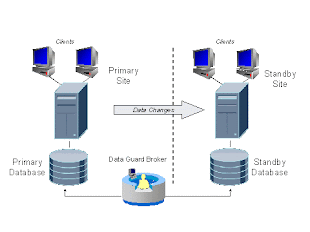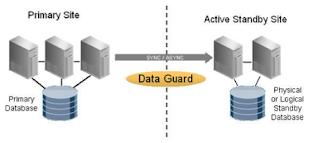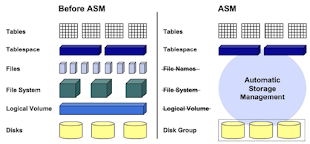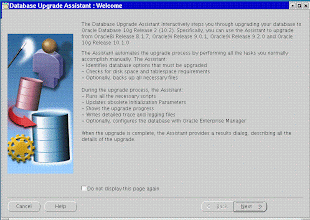
Wednesday, December 10, 2008
Oracle 11gR2 Installation on RHEL 4

Wednesday, December 10, 2008
Dataguard Adventures - Part I...!!!!!

Wednesday, December 10, 2008
Dataguard Adventures - Part II...!!!!!…

Wednesday, December 10, 2008
When ASM rebalancing stops...!!!!

Monday, December 8, 2008
Reducing Downtime during database movement and migrations
Non - Default Roles
While working on roles few days back, encountered an issue when all non default roles got changed to default when i missed adding the existing non-default roles in ALTER USER statement while assigning a new non-default role to a user.
DEFAULT ROLE
A default role means that the role is always enabled for the current session at logon. It is not necessary to issue the SET ROLE statement. To set a role as a DEFAULT role, you need to issue the ALTER USER statement.
NON_DEFAULT ROLE
Non default roles are the ones which are not enabled by default when a user logs into the database but must be enabled using SET ROLE statement.
STEPS TO BE FOLLOWED WHILE ASSIGNING NON_DEFAULT ROLES
1) Keep an output of existing state of roles assigned to the user in database.
SQL> select * from dba_role_privs where grantee='DUMMY' order by DEFAULT_ROLE desc,GRANTED_ROLE;
GRANTEE GRANTED_ROLE ADM DEF
------------------------------ ------------------------------ --- ---
DUMMY CSX_READ_ONLY_ROLE NO YES
DUMMY FDL_READ_ONLY NO YES
DUMMY CABOWNER_RO_ROLE NO YES
DUMMY PDD_CONNECT NO YES
DUMMY PDD_READ_ONLY_ROLE NO YES
DUMMY BSS_READ_ONLY_ROLE NO YES
DUMMY PROD_CATALOG_ROLE NO YES
DUMMY RPT_READ_ONLY_ROLE NO YES
DUMMY SUPPORT_EXECUTE_ROLE NO YES
DUMMY CDS_PROD_ROLE NO NO
DUMMY DATAFIX_ROLE NO NO
DUMMY CABOWNER_OPS_ROLE NO NO
DUMMY PDD_VIEW NO NO
The above output shows that user has some roles as NON_DEFAULT roles. We need to make sure that these NON_DEFAULT roles should not get affected after a new NON_DEFAULT role is assigned to user. Keep a note of all the NON_DEFAULT roles already assigned to user.
2) Grant the new NON_DEFAULT role to the user initially as DEFAULT role.
SQL> GRANT QMRC_DATAFIX TO DUMMY;
Grant succeeded.
3) Verify the status of new assigned role using
SQL> select * from dba_role_privs where grantee='DUMMY' order by DEFAULT_ROLE desc,GRANTED_ROLE;
GRANTEE GRANTED_ROLE ADM DEF
------------------------------ ------------------------------ --- ---
DUMMY CSX_READ_ONLY_ROLE NO YES
DUMMY FDL_READ_ONLY NO YES
DUMMY CABOWNER_RO_ROLE NO YES
DUMMY PDD_CONNECT NO YES
DUMMY PDD_READ_ONLY_ROLE NO YES
DUMMY BSS_READ_ONLY_ROLE NO YES
DUMMY PROD_CATALOG_ROLE NO YES
DUMMY QMRC_DATAFIX NO YES
DUMMY RPT_READ_ONLY_ROLE NO YES
DUMMY SUPPORT_EXECUTE_ROLE NO YES
DUMMY CDS_PROD_ROLE NO NO
DUMMY DATAFIX_ROLE NO NO
DUMMY CABOWNER_OPS_ROLE NO NO
DUMMY PDD_VIEW NO NO
From the output above, the new role has been assigned as DEFAULT ROLE.
4) Convert the newly assigned DEFAULT role to NON_DEFAULT role.
SQL> ALTER USER DUMMY DEFAULT ROLE ALL EXCEPT PDD_VIEW,DATAFIX_ROLE,CDS_PROD_ROLE,CABOWNER_OPS_ROLE,QMRC_DATAFIX;
User altered.
The point to note here is that we need to include all the existing NON_DEFAULT roles in the EXCEPT clause , otherwise the statement will change the existing NON_DEFAULT roles to DEFAULT.
5) Verify the state of new role as well as all the exiting NON_DEFAULT roles by using
SQL> select * from dba_role_privs where grantee='DUMMY' order by DEFAULT_ROLE desc,GRANTED_ROLE;
GRANTEE GRANTED_ROLE ADM DEF
------------------------------ ------------------------------ --- ---
DUMMY CSX_READ_ONLY_ROLE NO YES
DUMMY FDL_READ_ONLY NO YES
DUMMY CABOWNER_RO_ROLE NO YES
DUMMY PDD_CONNECT NO YES
DUMMY PDD_READ_ONLY_ROLE NO YES
DUMMY BSS_READ_ONLY_ROLE NO YES
DUMMY PROD_CATALOG_ROLE NO YES
DUMMY RPT_READ_ONLY_ROLE NO YES
DUMMY SUPPORT_EXECUTE_ROLE NO YES
DUMMY CDS_PROD_ROLE NO NO
DUMMY DATAFIX_ROLE NO NO
DUMMY CABOWNER_OPS_ROLE NO NO
DUMMY PDD_VIEW NO NO
DUMMY QMRC_DATAFIX NO NO
The above output shows the state of existing and newly granted NON_DEFAULT roles.
No comments:
Post a Comment